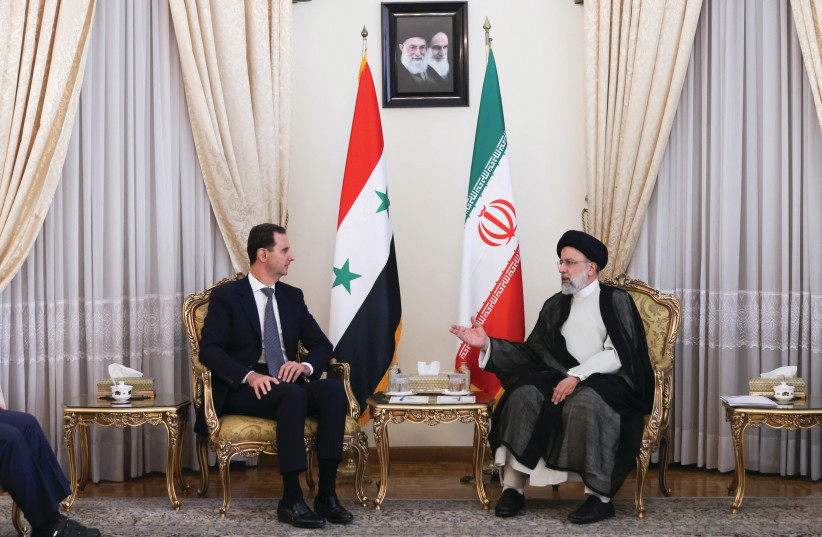Gulf countries are positioning themselves to push for Syria’s return to the region through new engagement, interactions and integration, all through diplomatic outreach. This process, which began primarily with the UAE’s push for high-level meetings with Damascus and symbolic visits by officials, has led to more discussion in Gulf media about what might come next. The narrative is clear: Syria’s reconciliation time has come.
One report from UAE-based Al-Ain media on Monday spelled out some of the “hopes” for a meeting between Syrian regime leader President Bashar al-Assad and Turkey’s President Recep Tayyip Erdogan. It is not clear that the meeting will take place, but there is talk of a meeting in Russia in early April composed of various officials.
The goal: To normalize ties with the Syrian regime and normalize the meetings. At every juncture, the normalization only grows, now as part of a preset process, as opposed to individual meetings.
Damascus' demands on Turkey
According to the report, Damascus demanded that Turkey stop supporting “terrorist” groups in northern Syria and withdraw from areas Ankara occupies in Syria, including Idlib and surrounding areas, like Afrin, as well as Jarabulus and areas near Manbij.
Turkey has invested a lot in expanding its operations in Syria over the last few years and has even threatened more attacks, mostly directed at the US-backed Syrian Democratic Forces (SDF) in eastern Syria.

Russia, Iran, the Syrian regime and Turkey are all interested in seeing the US gone from the area – but it may not be in Damascus’ best interests to trade US presence for increased Turkish presence.
At the same time, according to the report, sources told Al-Ain media that Tehran is trying to push for “Erdogan and Assad to meet, implement relations in light of developments and movement in the region.”
THE REPORT adds the meeting will take place next month, but only at the level of deputy foreign ministers: “Initial information indicated that this quadripartite meeting is within a process of restoring relations between Turkey and Syria, mediated by Iran and Russia… it was expected that this process would eventually end with a meeting between al-Assad and Erdogan, and that a major step would be taken to restore relations in light of Syria’s position in the Middle East.”
For Syria, there is little benefit to a high-level meeting if there isn’t more progress on Turkey changing its position in northern Syria, which so far, Ankara doesn’t seem to want to change.
And yet, Ankara is quietly urging Syrians to leave Turkey and return to Syria following the devastating earthquake in February.
Elections in Turkey will take place in May and the report in Al-Ain media says that this could contribute to accelerating a meeting between the Turkish and Syrian leaders. According to the report, “restoring relations will help solve many outstanding issues between the two countries that affect the Turkish internal situation.”
It adds that “the most prominent issue is the Syrian refugees in Turkey; the restoration of relations between Turkey and Syria contributes to the controversial issue of returning Syrian refugees to their country.”
Syrians in Turkey suffer from discrimination and there is a sense that Ankara is tired of hosting millions of Syrians that live within its borders. However, if Turkey withdraws from northern Syria, would the refugees even want to return?
This seems like a catch-22: Assad wants Turkey to withdraw while Ankara wants ties with Assad to ease with normalization to return Syrians, who won’t return if Turkey leaves. And, Syria won’t normalize ties unless there is a road map for Turkey’s exit. Turkey can’t normalize ties if it is seen as abandoning the Syrians.
And still, Ankara is interested in an increased Syrian army presence in areas controlled by Kurdish forces, such as Tal Rifat, and also areas in the northeast of the country. The Al-Ain report notes that “evidence indicates that not only Turkey is seeking to improve its relations with Syria, but the same signals can also be heard from several countries in the region, because many of these countries consider the situation in Syria to be stable.”
While voices within the UAE and Saudi Arabia may be inclined to back reconciliation, either quietly or openly, Qatar is already another question.
Qatar, like Turkey, has backed the Syrian rebels and would not want to be seen to be selling them out. But it is also close to Iran as well as a strategic US partner. This puts it in a unique position to conduct outreach, though it has so far signaled little interest to do so.
Clearly, the Syrian regime will want investment as it pushes forward with reconciliation. Watching how China has helped broker Saudi-Iran talks, the regime may think that even it may help play a role.
